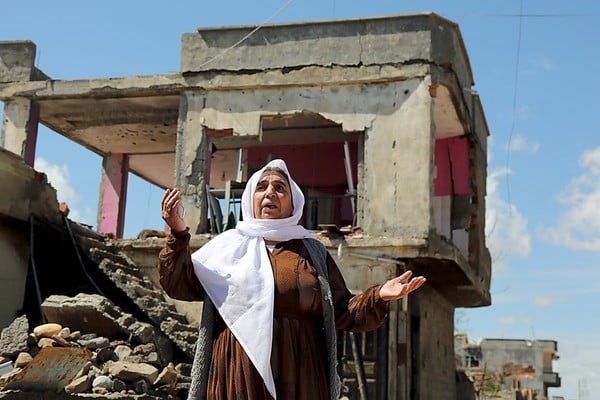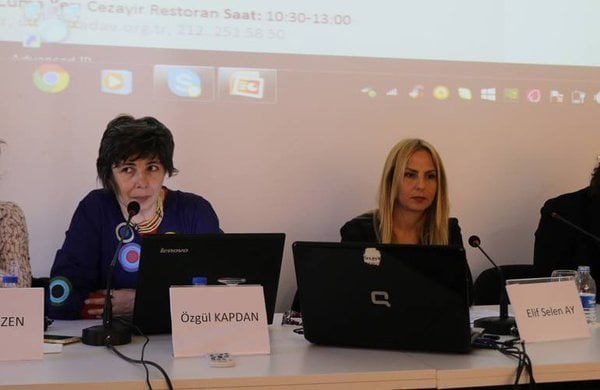
|
| Photo by Sertac Kayar/Reuters. A woman stands in front of her house damaged during clashes between Turkish security forces and Kurdish militants in the southeastern town of Idil, Turkey, March 31. A Turkish news agency run by female journalists is emphasizing the stories of women in the region. |
Turkey's all-women news agency works for change in the Middle East A Turkish news agency run entirely by women takes a bold stand for gender equality and press freedom in a region that suppresses both.
April 1, 2016 - Journalists have long been the targets of harassment and even death threats in Turkey. Yet one Turkish news organization is persisting despite tenacious setbacks.
Its website has been blocked four times for "supporting terrorism," and one reporter served three months in jail for covering a political demonstration. But the agency's aim goes one step beyond media freedom — it wants to give women a larger voice in the region by emphasizing and prioritizing their stories.
The Jin News Agency (JINHA) is completely staffed by women, offering news coverage of Turkey, Iraq, and Syria in multiple languages. ("Jin" means "woman" in Kurdish.) It's a strong mandate in a region known for its gender inequality that is also staggering under the weight of conflict.

|
| Photo from: JINHA Women's News Twitter |
"JINHA is the only agency of its kind in Turkey, but in the world, too, we are different from our counterparts," editor Dilan Karamanoglu told Al-Monitor. "Even when we cover ordinary events, we strive to highlight whatever is there in terms of female visibility."
The news agency gives precedence to statements from women during press conferences or seeks to use women or girls as the frame for a story. For example, a report about a Turkish town on the border of Syria that has been reduced to rubble begins, "Cizre women, whose houses have been burned and demolished and belongings have been pillaged, have strengthened [their] resistance and solidarity. The women said, 'All these are temporary.' Women ... [are] ready to rebuild the Cizre district of Sirnak."
The JINHA journalists would be hard-pressed to find a more dangerous headquarters for their experiment. Tensions are escalating in southeastern Turkey between the government and the PKK, or the Kurdistan Workers’ Party, a militant group pushing for Kurdish independence. On Tuesday, the US government called the families of its diplomats and military personnel home from the region.
The refugee crisis and threats from terrorist groups have strained Turkey's economy and politics, and journalists often pay the price as the government works to block reporting on corruption and national security issues.
In early March, government forces raided Zaman, Turkey's top daily newspaper, and quickly replaced a leadership board willing to criticize President Recep Tayyip Erdogan for one that would follow the party's line, the BBC reported. Riot police dispersed protests in favor of the free press with tear gas and water cannons.
Sevgi Akarcesme, editor-in-chief of Today's Zaman, the English version of the daily, told Reuters the raid was "the practical end of media freedom in Turkey," adding that "[t]he media has always been under pressure, but it has never been so blatant." She has since fled to Brussels.
Turkey ranks 77th on a list of 138 countries under a United Nations Development Programme ranking for gender equality. A rally before International Women's Day on March 6 was banned by the governor of Istanbul, who cited security threats. When the women marched anyway to bring international attention to domestic violence and low-female workplace participation, police dispersed the protest with rubber bullets, Reuters reported.
The Kurdish women of JINHA draw on the activist tradition of a political movement that has encouraged and utilized the skills of women.
"JINHA is the product of a strong trend of female emancipation and activism that the Kurdish political movement has spurred in Turkey’s southeast over the past several decades," Mahmut Bozarslan reported for Al-Monitor. "Gender equality appears prominently on the Kurdish agenda, and women are omnipresent in the forefronts of Kurdish political life, where a system of male-female co-chairmanship is meticulously followed in various fields and positions."
In the field, however, the female journalists must sometimes prove themselves to suspicious male colleagues and taunting police officers.
"When our reporters go out, the police threaten them," Guzide Diker, JINHA's English translator, told the Los Angeles Times. "They say: 'Why are you here? Don't come again. If you come again, we will beat you.'"
The women of JINHA have plans for expansion, and soon hope to report in Arabic.
Page created on 4/5/2016 6:42:19 PM
Last edited 4/5/2016 6:42:19 PM


